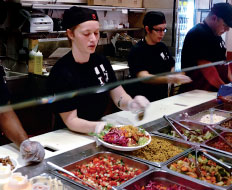Sustainability is increasingly top of mind for both brands and consumers. But a recent study from The Hartman Group, a firm that studies consumer culture, showed that consumers don’t always reward sustainable brands with their purchases, despite the fact that they want to see companies using sustainable practices.
For quick serves, this may mean that no matter how much a brand uses sustainable products, it may not see a spike in revenue. Helen Lundell, an analyst for The Hartman Group, says restaurant owners must understand that their consumers are busy and that sustainability is ultimately not a deciding factor when making purchases.
But brands shouldn’t assume they don’t have to use sustainable practices at all, she warns. “People do believe that companies should be trying to make the world a better place,” Lundell says. “Doing something positive can build loyalty to your brand.”
Quick serves, Lundell says, must prove to customers how sustainability can benefit them personally. For example, if consumers know that a business is using free-range meat, they might assume that the product is better for them; likewise, if the company is composting, then guests may think it’s better for their community.
For brands that are known for sustainability, the Hartman Group research proves what they already know: Customers want to support a company that cares, says Peter Nolan, chief brand officer for Roti Mediterranean Grill, a fast casual with locations in D.C., New York, and Chicago. The company recently switched to FreeBird free-range chicken in all of its stores, and he says it has been a “big success.”
“We’re always looking for ways to be more sustainable,” Nolan says. “Our consumers do care and understand that companies that care about one thing are going to care about other things. Are they going to drive 30 minutes to buy sustainable products? Probably not.”












